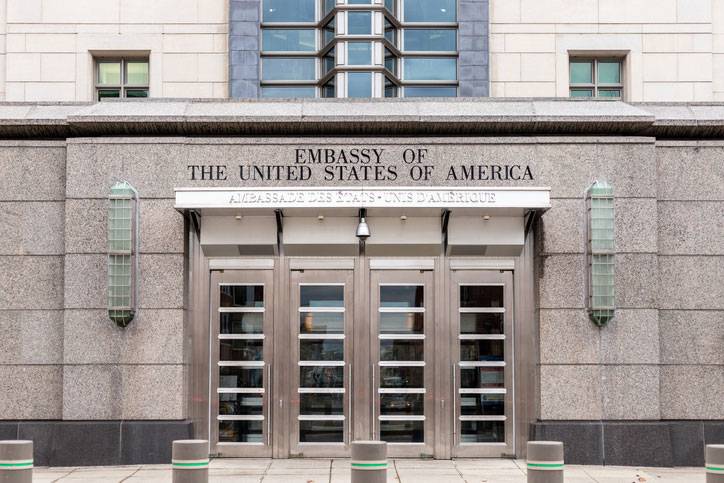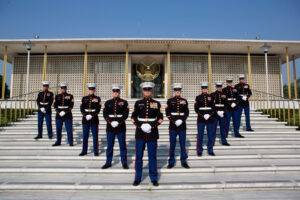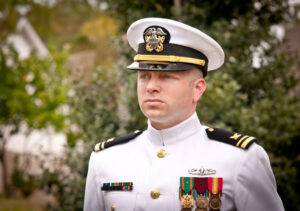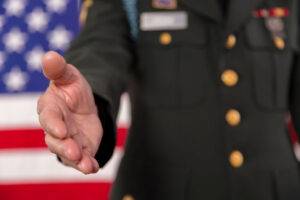
The appearance of U.S. Department of Defense (DoD) visual information does not imply or constitute DoD endorsement.
At first glance, you might think the armed forces are a bad choice for preparing for a career in diplomacy. After all, they mostly seem to end up getting involved when diplomacy breaks down.
But that’s an incomplete picture of the modern American military. First, because the armed forces are the last resort in international relations, the Pentagon pays a lot of attention and often has a seat at the table when advising on negotiations.
Second, the American military is a globe-spanning enterprise. The Department of Defense (DoD) has bases, ships, and allies around the world. Joint training exercises and dealing with foreign governments are a common experience.
A private in the Fleet Marine Force may have more real-world experience dealing with foreign cultures and in foreign countries than some senior government officials.
Senior military officers have to be as well-versed on the culture, politics, and national goals of countries in their area of responsibility as any diplomat. In fact, generals are trained to be diplomatic—for good reason. It was said of General Norman Schwarzkopf, the Allied Commander in Chief during the Gulf War, that he presented the battle plans for Operation Desert Storm to the Saudis with such tact and delicacy that they left the briefing believing it had been their idea. If a general with the nickname Stormin’ Norman can pull that off, imagine what other officers can achieve in international relations.
Explore Your Military Training and Degree Options
The Diplomatic Continuum Runs Right Through the American Military
 Foreign relations for the United States are inextricably tied with our military. As the largest and most powerful in the world, it doesn’t need to be mentioned to be a presence in any international discussions.
Foreign relations for the United States are inextricably tied with our military. As the largest and most powerful in the world, it doesn’t need to be mentioned to be a presence in any international discussions.
American military personnel, and officers in particular, are very much trained with this in mind. In fact, it may be your service in the military that gets you interested in international relations and diplomacy in the first place.
Military Jobs in International Relations and Diplomacy
International relations are so important in the armed forces that several services have a dedicated specialization for officers who are experts in different regions of the world. These Foreign Area Officers (FAO) have a unique training pipeline to learn critical diplomatic skills like:
- Foreign language proficiency in at least one common language in the area
- Cultural, sociological, and political understanding of countries and peoples
- Geographic and economic education
There are four branches which maintain Military Occupational Specialties (MOS) for FAOs:
- Army - MOS 48 series Foreign Area Officers
- Navy - Restricted Line Fleet support officers with 171x designators
- Air Force - AFSC 16Fx Foreign Area Officers and 16Px Political-Military Affairs Strategists
- Marine Corps - 824x Foreign Area Officer and 822x Regional Affairs Officers
FAO are sorted by region, each with a different MOS. These officers serve in American embassies as defense attachés, work as security assistance officers to aid foreign militaries in procurement and training, and work in strategic planning at the Pentagon or unified combatant commands. The on-the-job expertise they get through those careers is unparalleled international relations and diplomacy preparation.
Although every service other than the Coast Guard and Space Force has FAOs, there are a variety of other roles that may offer strong diplomatic preparation. It comes down in some cases to mission and tradition. The Coast Guard and Navy, for instance, have a long tradition of counting on every ship’s captain and company to be ambassadors while on port call in foreign countries. And supply officers get plenty of experience diving into the realities of local economics and business culture.
What if You Are Enlisted but Interested in International Relations and Diplomacy?
 You’ll notice that just about every job we just mentioned is restricted to officers. And that means showing up with a four-year college degree before you even join the service. But if you don’t have that degree already, don’t give up on an international relations career. There are also enlisted roles that can get you started on the right path.
You’ll notice that just about every job we just mentioned is restricted to officers. And that means showing up with a four-year college degree before you even join the service. But if you don’t have that degree already, don’t give up on an international relations career. There are also enlisted roles that can get you started on the right path.
Of course, a background in any intelligence specialty offers some preparation for work in diplomatic services. Much of the same work that goes into gathering intelligence and interpreting trends and intentions is important for negotiation and understanding in matters of state as in combat. In these cases, the more strategic your billet, the better.
Logistics is another area that offers some good experience for future diplomats. If you’ve spent an entire tour haggling over ice cream deliveries or lubricant contracts with businesses overseas, you’ve learned as much as there is to learn about delicate international negotiations.
And, of course, military linguists have a leg up when it comes time to engaging with foreign companies and dignitaries. You will always go further in international relations when you speak the language of those you are trying to relate to.
The security clearance you could get in the military is always a useful addition to your credentials when pursuing a career in diplomacy.
Military Training Offers Intensive Preparations or Even Degrees in International Relations Fundamentals
 For enlisted personnel, you’ll be sent to a service school or training unit for up to 64 weeks depending on your specialization. That training won’t be focused on international relations, but as long as you are in one of the MOS categories listed above, it will have some relevance.
For enlisted personnel, you’ll be sent to a service school or training unit for up to 64 weeks depending on your specialization. That training won’t be focused on international relations, but as long as you are in one of the MOS categories listed above, it will have some relevance.
While you are in the service, you can look for other opportunities to get training that will prepare you for a degree in international relations and diplomacy. Again, outside the officer corps, there isn’t much that is specific to the role. But with in-service benefit options like Military Tuition Assistance and COOL, the DoD Credential Opportunities On-Line program, you can get creative to find ways to study on your own or get sent to other training that will be useful.
Of course, every deployment is an opportunity to learn more about other cultures and regions. Don’t miss your chances to soak up local history and culture while you are overseas!
The Reserve Officer Training Corps May Help You Earn a Bachelor’s Degree
Since the best jobs for getting international relations and diplomacy belong in the officer corps, you’ll want to think about military benefits that can help pay for your education before you join. And for officers, the number one option is ROTC.
ROTC programs are available for every service except the Coast Guard. They offer two, three, or four-year scholarships to a participating civilian university. These scholarships cover your entire cost of tuition, stipends for books and supplies, and in some cases even a basic monthly living stipend.
More than 1,700 colleges participate in the Reserve Officer Training Corps program.
The criteria for which scholarship you qualify for will depend on when you enter the program and on service-specific needs and requirements. The Navy and Air Force, for example, keep lists of in-demand degree specializations, and prioritize those for scholarships.
Advanced Military Schooling Can Send You to College for Free
 Particularly if you are on the FAO path, you can count on your military career to get you most of the training you need for jobs in international relations and diplomacy.
Particularly if you are on the FAO path, you can count on your military career to get you most of the training you need for jobs in international relations and diplomacy.
For starters, FAOs are all at grades O3 and above, which means you will have served for 3 or more years before you can even begin training. And that training pipeline in most cases will send you on to graduate-level studies and even master’s degree programs in national security, diplomacy, or international relations.
Defense Languages Institute – DLI factors into training for almost every FAO, but it is also an option in many other military specialties. The school offers associate’s, bachelor’s, and master’s degrees in a wide variety of foreign languages, all of which offer a head start in international relations programs.
Naval Postgraduate School – Both Army and Navy FAOs end up here as a matter of course, but officers in other specializations may also be sent to the same master’s programs offered in Defense Analysis or National Security Affairs.
National Defense University – The university’s College of International Security Affairs offers a Master of Arts in Strategic Security Studies that offers solid groundwork for international relations positions.
In some cases, FAOs or other officers are also sent out to civilian universities to earn their degrees. Branch-specific programs have different ways of applying for and paying for these outside programs, but generally you will get full tuition and supplies, in addition to keeping your regular military salary and benefits.
Corporate and Government Jobs in International Relations and Diplomacy
The first thing that probably springs into your mind, as a former government employee yourself, is all the government jobs in this area. It’s true that the State Department is probably the biggest employer of graduates in this field. And there are many, many roles in federal, state, and local agencies where this training is a plus.
Commerce and tourist agencies, international law enforcement, customs, and border protection… they all have liaisons with foreign countries.
But there’s a big private sector demand for people with skill in international relations as well. Companies trying to do business overseas, or simply putting together supply chains and shipping arrangements, all need experts who can find key officials, get information, and negotiate requirements along the way.
Diplomatic and International Relations Salaries
 Just like in the military, it’s pretty easy in the foreign service to know what everyone makes: the General Schedule for civilian government jobs is public record, and the State Department publishes their Foreign Service salary schedule.
Just like in the military, it’s pretty easy in the foreign service to know what everyone makes: the General Schedule for civilian government jobs is public record, and the State Department publishes their Foreign Service salary schedule.
There are 9 classes of service with 14 possible steps for advancement. Where you fall will depend on your education and experience. For 2022, the base salary at class 6, step 5, the lowest point of entry for someone with a bachelor’s degree, is $48,968. At the very top, though, class 1, step 14, the base is $146,757.
Overseas postings come with more money—that same class 6, step 5 job would come to $59,261.
These are all subject to incentive pay and other bumps depending on your individual qualifications—which should be excellent, with your military background.
In the private sector, there’s no common job title that goes along with this role. International relations jobs can pop up in sales, or government affairs, or as the Senior VP for Overseas Operations. That makes it tough for the Bureau of Labor Statistics to offer definitive salary information. But most of the jobs will fall into their bucket for Top Executives.
For 2021, the median salary in the category of top executives, where many international relations jobs fall, was $98,980 per year.
On top of salaries, many governmental and non-governmental organizations, including private companies, sometimes offer generous allowances and incentives for overseas diplomatic work that could cover:
- Moving expenses
- Rent
- Housekeeping service
- Foreign healthcare coverage
- Hazardous duty pay, if in risky parts of the world
Although not counted in your base pay, those kinds of benefits can add up.
And of course there is the biggest incentive for getting into international relations work: foreign travel. You’ll see exotic parts of the globe at your employer’s expense and come home with stories that might even be as interesting as those you got in the service.
Choosing the Right Degree Program in International Relations and Diplomacy
 When the time comes to pick up your degree, a lot will depend on where you are coming from as well as where you want your career to go.
When the time comes to pick up your degree, a lot will depend on where you are coming from as well as where you want your career to go.
Foreign Area Officers are very likely to already have a master’s degree; picking up another can broaden or re-focus their expertise to different parts of the world or areas of international relations. Or going on to a doctorate can unlock teaching jobs or prestigious think-tank positions.
Other officers may need to go to the master’s level to broaden their existing college experience into something specific to international relations. These also open up mid-range options in diplomacy or corporate international relations work.
And enlisted veterans are probably looking at their first college degree and may open the door to entry-level jobs in international relations through one of these programs.
There are very few degrees in international relations and diplomacy below the bachelor’s level. Those that exist are primarily transfer degrees, intended to give you a low-cost way to get in the first two years of essential studies required for a baccalaureate program.
Bachelor’s Degrees in International Relations and Diplomacy
The four-year bachelor’s degree is where you get your feet wet in international relations. With a good general knowledge education rounded out with specific coursework in the international system, history, and basic language skills, you’re on your way to entry level positions in government or business.
Master’s Degrees in International Relations and Diplomacy
A two-year master’s degree is the level where you will start being trusted with serious international relations responsibilities. These programs dive into the details of intercultural communication and analysis, training you in the critical-thinking and problem-solving skills you need for senior-level diplomatic roles.
Doctoral Degrees in International Relations and Diplomacy
Doctoral programs in this field prepare you for the deep thinking and high-level diplomatic skills you find in research organizations, the highest levels of government service, and major international corporations. A PhD program usually takes around five years and allows you to explore your own ideas and focus your studies in your area of interest. A PhD is typically required to teach in international relations as well.
A Broad Curriculum Offers the Right Approach for Diplomacy
 All good international relations and diplomacy degrees have their foundations in a traditional liberal arts education. So much of the job has to do with culture and history that it’s hard to get through more specialized parts of the coursework unless you’ve covered this first. And courses in communication, political science, and other liberal studies equip you for clear, rational thinking and problem-solving of the sort that is necessary in negotiation.
All good international relations and diplomacy degrees have their foundations in a traditional liberal arts education. So much of the job has to do with culture and history that it’s hard to get through more specialized parts of the coursework unless you’ve covered this first. And courses in communication, political science, and other liberal studies equip you for clear, rational thinking and problem-solving of the sort that is necessary in negotiation.
Beyond those basics, though, you’ll quickly get into high-level considerations of foreign policy and international diplomacy. Most degrees cover these in classes like:
International Law and Systems – The international system is unlike anything that exists within nations, and significant coursework will go into explaining how it works.
Conflict Studies – Competing interests sometimes lead to conflict. You’ll learn the why and the how that drives disputes, including the seeds of how to resolve them.
Global History and the Evolution of the Nation-State – How the modern system of nation-states came to exist is a fascinating story. More importantly, it’s a story you’ll need to understand to truly understand how it works today.
Foreign Aid and Development – International relations can include a significant amount of foreign aid work. You’ll learn how these systems are set up and how they are used to provide assistance globally.
International Organizations and Globalization – You’ll learn about major international organizations like the United Nations or World Bank, and other mechanisms for coordinating between nations.
Negotiation and Diplomatic Protocol – Finally, you’ll take courses that explore how disputes are resolved and how negotiations are conducted to avoid creating additional friction or difficulties. The protocol of maintaining relations with foreign countries is explained and taught.
In most cases, you’ll also have a chance to pick from a wide range of electives. These will usually include specific classes that cover the regions of the world where you plan to focus your career.
Overseas Internships Are a More Pleasant Way To Get International Experience Than Deployments
 If you spent a lot of time overseas in the military, you might feel like a foreign trip or internship is a little redundant. But get ready to see things you already experience through new eyes.
If you spent a lot of time overseas in the military, you might feel like a foreign trip or internship is a little redundant. But get ready to see things you already experience through new eyes.
A placement with the right organization will give you new perspectives on what you thought you already knew about foreign cultures and relations. By studying and working beside accomplished professionals in the field, you’ll hone your own abilities to see all the angles and solve cultural issues creatively.
And simply spending time immersed in foreign culture aids in understanding. It’s also an opportunity to give your language skills a workout.
Concentrations in International Relations and Diplomacy Degrees Focus Your Expertise
 Many degrees in international relations and diplomacy offer the option to take a concentration in a specific area of interest. You’ll get the same general training as others in the program, but more coursework that focuses specifically on the field you plan to specialize in.
Many degrees in international relations and diplomacy offer the option to take a concentration in a specific area of interest. You’ll get the same general training as others in the program, but more coursework that focuses specifically on the field you plan to specialize in.
There are as many concentrations for these degrees as there are applications. That means you can find specializations at different schools such as:
- Global Health and Development
- Conflict Resolution
- Diplomacy
- International Economics and Consulting
Regional concentrations are also very common. Different colleges define areas of study differently, but you will mainly find programs focused on regions such as:
- Central and South America
- Europe
- Africa
- Asia
Finding Military-Supportive Universities for International Relations and Diplomacy Degrees
Once you have figured out what degree you are aiming for, you’ll have to figure out what colleges to apply to. And you’ll need to make sure they understand where you are coming from and how to help you get there. That means finding military friendly schools who have seen a vet before and have taken the time and trouble to offer a helping hand to former military members.
The most important part of this support structure is accepting GI Bill® benefits. The GI Bill® is probably the broadest, most generous, and most commonly used of all veterans educational benefits.
The first person to ever make use of GI Bill® educational benefits did so to earn a degree in international relations. Don Balfour was enrolled in the foreign commerce degree program (precursor to today’s international relations degrees) at George Washington University and applied for veteran’s benefits the day after the GI Bill® was signed into law.
But many colleges check that box. A better sign is whether they offer a companion piece to the GI Bill®: the Yellow Ribbon Program.
Yellow Ribbon is a partnership between colleges and the VA. It’s used at private schools or state universities that charge differently for out-of-state students. For vets who attend, Yellow Ribbon kicks in funding to help cover the difference between the GI Bill® rates and actual tuition costs.
Since each school decides to participate, how many vets to accept, and how much money to kick in, you get a pretty good idea which ones are putting their money where their mouth is.
Universities that participate in the Yellow Ribbon Program play a key role in international relations and diplomacy studies. Some of the best programs in the field are found at elite Ivy League schools or even colleges overseas.
With that kind of assistance, even the most impoverished GI can take advantage of some of the highest-price international relations education programs today. And those are the degrees that get you in the right doors.
Military-supportive schools often go far beyond that, though. You’ll also want to look for programs such as:
- Special tuition rates and admissions policies for veterans
- On-campus support and veterans groups
- Dedicated academic advising and tutoring support for vets
- Credits offered for military training or experience
 A military-supportive school will understand how to help you leverage your expertise and experience in the service and turn it into an advantage for your degree in international relations and diplomacy. With a wealth of that experience behind you, you want a school that understands all the advantages you have and helps you use them.
A military-supportive school will understand how to help you leverage your expertise and experience in the service and turn it into an advantage for your degree in international relations and diplomacy. With a wealth of that experience behind you, you want a school that understands all the advantages you have and helps you use them.
Those advantages also extend far beyond just your direct expertise and training. Military service offers a lot of other, more personal benefits that help with school. You will have learned important lessons and developed key character traits like:
- Perseverance
- Attention to detail
- Personal integrity
- Respect
- Discretion
Not only are those qualities that will get you through school, but they are also the characteristics of an excellent diplomat. With a little tact and polish layered onto your foundation as someone who means what they say, you just might be the kind of negotiator, analyst, or representative of corporate or national interests the world needs.
2021 US Bureau of Labor Statistics salary and employment figures for Top Executives reflect national data, not school-specific information. Conditions in your area may vary. Data accessed August 2022.





